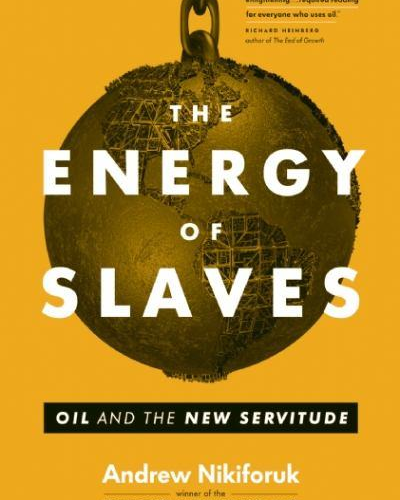Most of us think little about slavery, convinced that this scourge is behind us. Canadian journalist (and A\J columnist) Andrew Nikiforuk’s new book claims otherwise, arguing that servitude has not vanished but merely changed form. Today’s slavery is not confined to Jews or Africans, but encompasses all of us who live within the culture of oil.
Most of us think little about slavery, convinced that this scourge is behind us. Canadian journalist (and A\J columnist) Andrew Nikiforuk’s new book claims otherwise, arguing that servitude has not vanished but merely changed form. Today’s slavery is not confined to Jews or Africans, but encompasses all of us who live within the culture of oil. Fossil-fuelled mechanization initially seemed to be a liberating force, promising to end child labour, enfranchise women and enhance workers’ rights, but The Energy of Slaves details oil’s history of destructiveness and contribution to oppression. Nikiforuk suggests that we are servants to petroleum and the machines we employ are akin to mechanical slaves.
In the late-19th Century, John D. Rockefeller’s Standard Oil built its business by bribing politicians. In the 20th Century, Texas oil dollars supported the witch-hunts of Senator Joe McCarthy and North Sea crude buoyed the political fortunes of Margaret Thatcher. Oil has boosted autocrats in Saudi Arabia, dictators in Burma, and Tea Partiers in the US. It fuels the world’s armies, and thus bears partial responsibility for the injury and death they cause. Military consumption of oil is titanic – the Pentagon alone oversees the combustion of 400,000 barrels per day.
Also enormous are oil’s financial costs. Across the globe, annual subsidies to gasoline consumers and drilling companies amount to $700-billion. In Britain alone, congestion, motor vehicle accidents and car-derived pollution cost $30-billion a year. These are useful numbers to have when detractors of renewable energy claim that wind and solar power are too expensive.
The most trenchant aspect of Nikiforuk’s analysis shows fossil fuels’ effect on agriculture. It’s not just that the petroleum-based pesticides and natural gas-based fertilizers of modern farming pollute the air and water, creating dead zones in places like the Gulf of Mexico. It’s also that this system imposes a monoculture. There used to be 30,000 varieties of wheat; now we grow only three or four. This loss of diversity, embedded in factory farming’s very nature, makes our food terrifically vulnerable to blight and pests. But business eschews crop multiplicity because it’s harder to manage.
However, oil’s mastery of agriculture need not be absolute. Cuba responded to the loss of Soviet petroleum in 1991 by increasing the number of small farms on the island, employing oxen instead of tractors, and going partially organic. The outcome was greater food security and a message to the world that non-fossil-fuel agriculture can be viable.
On a few occasions, The Energy of Slaves stumbles. Nikiforuk suggests renewable energy couldn’t satisfy China’s power demands, but gives slim evidence to support the claim. Mark Jacobson of Stanford University and other scientists argue that by 2030 renewables could power the entire world. But even if Jacobson is wrong and renewables couldn’t meet China’s entire energy needs, they could certainly make a significant contribution. What is to be gained by discounting the possibility?
Nikiforuk also criticizes wind power for having an “energy return on energy investment” that is much lower than coal’s, but the comparison is silly. We need to eliminate coal no matter how attractive its returns are because it jeopardizes our very survival. It’s irresponsible to suggest this fuel has any meaningful advantage over renewables; any discussion that includes even a whiff of moral obligation simply has to take it off the table.
Drawing from research in history, economics, sociology and philosophy, The Energy of Slaves is the product of enormous scholarship and a significant contribution to environmental literature. That said, not all of its insights are new. More than 50 years ago, poet Robert Lowell lamented that our automobiles embody “a savage servility” that “slides by on grease.” In a Civil War-themed poem from early 1960s, “For the Union Dead,” Lowell suggested that slavery has not disappeared but merely assumed a new mechanical guise, facilitated by oil.
The Energy of Slaves: Oil and the New Servitude, Andrew Nikiforuk, Vancouver: Greystone Books/David Suzuki Foundation, 2012, 282 pages
Subscribe now to get more book reviews in your mailbox!
Reviewer Information
Gideon Forman is a long time peace and environmental activist.













